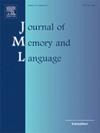Hearing a code-switch increases bilinguals’ attention to and memory for information
IF 3
1区 心理学
Q1 LINGUISTICS
引用次数: 0
Abstract
In conversation with each other, bilinguals sometimes code-switch between their shared languages. While psycholinguistic research often highlights the challenges of processing code-switches compared to single-language utterances, bilinguals seem to navigate code-switching with ease. Alongside empirical evidence that code-switching does not always disrupt comprehension in natural contexts, this raises intriguing questions about the potential benefits of code-switching. We propose that code-switching enhances bilingual listeners’ attention to the speech signal, improving the encoding and memory of linguistic messages near the switch. In Experiment 1, Spanish-English bilinguals listened to code-switched and single-language stories, occasionally reported their attention levels, and later answered comprehension questions. They reported greater attention to and demonstrated increased memory for code-switched content. Experiment 2 tested whether this attentional effect was simply due to the saliency of language changes by having English-speaking monolinguals complete the same task. Although monolinguals showed better memory when reporting higher attention, they did not show increased attention following code-switches. These findings suggest that bilinguals’ experience with the communicative contexts in which code-switches typically occur enables them to focus their attention on speech content during a code-switch, aiding in their collection and retention of that content over time.
听到语码转换可以增强双语者对信息的注意力和记忆
在彼此交谈时,双语者有时会在他们共享的语言之间进行代码转换。虽然心理语言学研究经常强调与单语言话语相比,处理代码转换的挑战,但双语者似乎很容易驾驭代码转换。除了经验证据表明语码转换并不总是破坏自然语境中的理解外,这也引发了关于语码转换潜在好处的有趣问题。我们认为语码转换增强了双语听者对语音信号的注意,提高了语码转换附近语言信息的编码和记忆。在实验1中,西班牙语-英语双语者听编码转换和单语故事,偶尔报告他们的注意力水平,然后回答理解问题。他们对编码转换的内容表现出更强的注意力和更强的记忆力。实验2通过让说英语的单语者完成同样的任务来测试这种注意力效应是否仅仅是由于语言变化的显著性。尽管单语者在报告注意力较高时表现出更好的记忆力,但他们在代码转换后并没有表现出更高的注意力。这些发现表明,双语者在语码转换通常发生的交际环境中的经验,使他们能够在语码转换期间将注意力集中在言语内容上,有助于他们随着时间的推移收集和保留这些内容。
本文章由计算机程序翻译,如有差异,请以英文原文为准。
求助全文
约1分钟内获得全文
求助全文
来源期刊
CiteScore
8.70
自引率
14.00%
发文量
49
审稿时长
12.7 weeks
期刊介绍:
Articles in the Journal of Memory and Language contribute to the formulation of scientific issues and theories in the areas of memory, language comprehension and production, and cognitive processes. Special emphasis is given to research articles that provide new theoretical insights based on a carefully laid empirical foundation. The journal generally favors articles that provide multiple experiments. In addition, significant theoretical papers without new experimental findings may be published.
The Journal of Memory and Language is a valuable tool for cognitive scientists, including psychologists, linguists, and others interested in memory and learning, language, reading, and speech.
Research Areas include:
• Topics that illuminate aspects of memory or language processing
• Linguistics
• Neuropsychology.

 求助内容:
求助内容: 应助结果提醒方式:
应助结果提醒方式:


